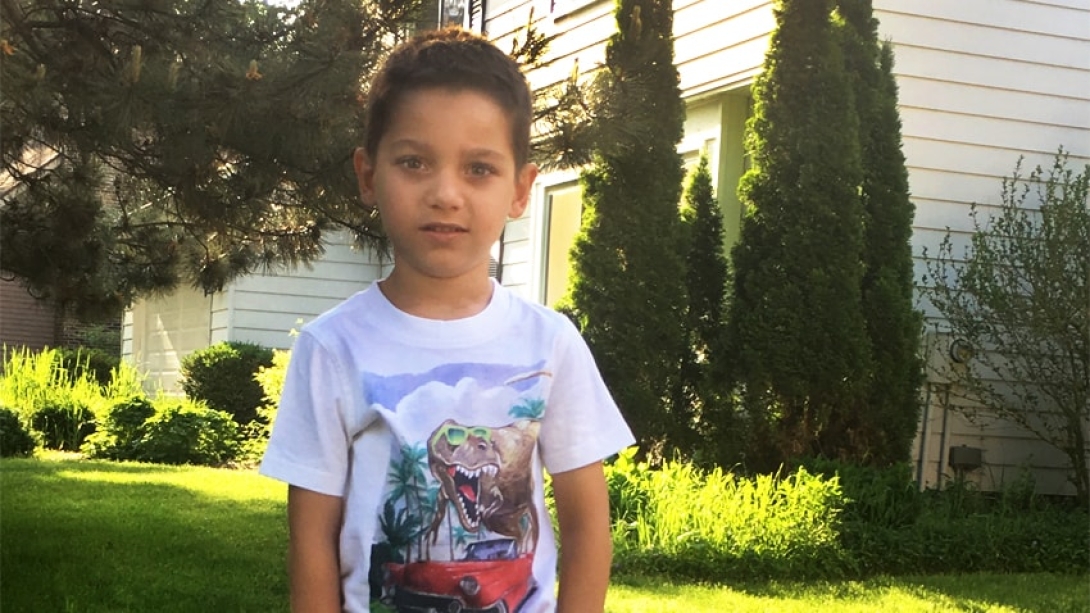More than half of children saw either partial or complete cancer remission in an international clinical trial — an "extraordinary success."
4:30 PM
Author |
For seven months, three-year-old Emil Abbasov underwent chemotherapy to fight the tangerine-sized, cancerous tumor growing in his abdomen. But each time, the tumor resisted harder. Each time, he felt more treatment side effects.
Surgery helped remove some of the tumor, but not enough. So doctors at the University of Michigan's C.S. Mott Children's Hospital took a new approach, combining immunotherapy and chemotherapy in a nonconventional way.
After 17 rounds of the combination treatment, Emil's tumor was completely gone.
The now-first grader is among a group of patients with hard-to-treat neuroblastoma who responded so well to the novel treatment combination in a Children's Oncology Group international clinical trial that researchers plan to expand the study to include more children. C.S. Mott pediatric oncologist Rajen Mody, M.D., who led the research, recently presented the preliminary findings at the American Society of Clinical Oncology meeting.
When standard therapies don't work, as in Emil's case, or the cancer returns, the battle against the disease is grim — less than 5 percent of these young patients survive.
After the first year of receiving the novel treatment combination in the COG trial, 9 out of 17 children with relapsed neuroblastoma saw either a complete or partial remission — a 53 percent response rate compared to the typical 10 to 12 percent response rate from chemotherapy or biologic therapy alone.
"The outcomes for relapsed neuroblastoma are dismal, and treatment options are limited," Mody says. "We found that in more than half of patients receiving this new combination therapy, the tumor either shrank or completely disappeared, which we consider an extraordinary success. Our study was small, but the results are so striking, they warrant further research to study the biological basis of why this combination of immunotherapy and chemotherapy works so well."
The phase II COG trial involved 35 patients, but researchers are planning to open a larger form of the trial soon.

How it works
Neuroblastoma is a solid tumor caused by uncontrolled or abnormal cell growth in nerve cells. Doctors think the cancer cells in patients whose bodies resist neuroblastoma treatment have found a way to keep immune cells from doing their job: fighting the cancer cells.
Typically, patients with neuroblastoma undergo one of two types of therapy — chemotherapy, which uses drugs to stop or slow the growth of cancer cells, or immunotherapy, which stimulates the immune system to work harder or smarter to attack cancer cells. The two treatments have typically been used on their own, however, not simultaneously.
The COG trial provided patients with a novel combination of chemotherapy and immunotherapy drugs to re-engage the immune cells to recognize and attack the cancer cells. The combination has been used successfully in other diseases, such as lymphoma.
Emil's mother, Feruza Alishanova, recalls watching her son "get weaker every day while the cancer got stronger," and says the disease seeming "unbeatable." She's thankful he responded to the new therapy and hopes more research helps other children, too. Emil, now seven years old, lives in Okemos, Michigan.
Neuroblastoma affects about 700 people a year in the U.S. and accounts for 6 percent of all childhood cancers in the country. The disease sometimes forms before birth, but is most often discovered later in life as the tumor grows and affects the body.
We hope this is the beginning of a path to learning how to cure cancer in more children facing this devastating disease.Rajen Mody, MBBS
"What we are learning through this research could revolutionize treatment for children with relapsed or hard to treat neuroblastoma," Mody says. "We hope this is the beginning of a path to learning how to cure cancer in more children facing this devastating disease."
The new research comes on the heels of additional major findings in the area of precision oncology released by U-M in 2015 involving genome sequencing to help determine the best treatment options for children with rare, aggressive and advanced cancer.
Learn more about related research at www.mottchildren.org/cancer.

Explore a variety of health care news & stories by visiting the Health Lab home page for more articles.

Department of Communication at Michigan Medicine
Want top health & research news weekly? Sign up for Health Lab’s newsletters today!





